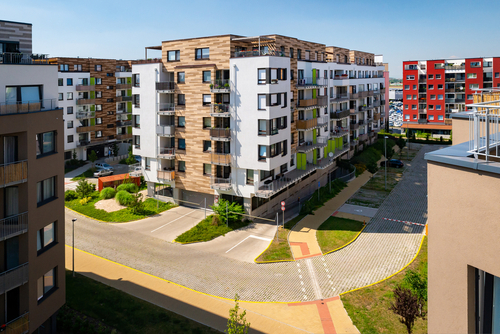Financing Multi-Family Properties With Hard Money Loans
There are plenty of ways to invest in real estate and finance properties. Investing in real estate can be a great way to build wealth, whether you want to buy rental properties, finance a fix-and-flip project, or pool money with other investors for a larger property. One popular investment strategy is financing multi-family properties. If you want to learn more about the benefits of investing in multi-family real estate and why a hard money loan could be right for you, just keep reading.

Contents of This Article:
- What Is a Multi-Family Property?
- Why Invest in Multi-Family Properties?
- 5 Options for Financing Multi-Family Properties
- Pros and Cons of Using Hard Money for Your Investment
- Tips for Finding a Reliable Local Lender
What Is a Multi-Family Property?
A multi-family property is a real estate investment containing multiple individual housing units within a single building or structure. For instance, apartment buildings, duplexes, townhouses, and condominiums.
These housing units are designed to accommodate separate households or families, each with individual living spaces, kitchens, bathrooms, and entrances. Multi-family properties can range in size from small duplexes to larger apartment buildings containing several units.
Financing multi-family properties can offer various benefits, like generating income from multiple tenants and potentially benefiting from property appreciation over time. These properties provide housing solutions for various individuals and families, often in urban or suburban areas.
Additionally, there are several ways to invest in multi-family properties, whether you choose the traditional financing route or work with Baltimore hard money lenders. Next, we’ll go over why some investors choose to invest in multi-family properties.
Why Invest in Multi-Family Properties?
Investing in multi-family properties offers several benefits for investors looking to diversify their portfolios and build long-term wealth. Some of the main advantages of investing in multi-family properties include the following.
- Multiple Streams of Income- Multi-family rental properties house multiple tenants in separate units, providing multiple rental income streams. This steady cash flow helps cover property and mortgage expenses, all while generating a profit.
- Portfolio Diversification- Multi-family properties offer a way to diversify your investment portfolio beyond traditional assets like stocks and bonds. Additionally, real estate investments can act as a hedge against market volatility.

- Property Appreciation- Well-located multi-family properties in growing neighborhoods can appreciate in value over time, leading to potential capital gains when you decide to sell.
- Professional Management- Larger multi-family rentals may need professional property management services. If so, this can free up your time and ensure the property is managed and maintained effectively.
- Flexibility in Financing- Financing options for multi-family properties can be more flexible than other real estate types. Generally, lenders look at the property’s income potential, which can help you qualify for better loan terms.
- Housing Demand- In urban and suburban areas, the demand for multi-family rental units can be consistently strong due to population growth, changing demographics, and affordability considerations.
- Tax Benefits- Real estate investing, including multi-family properties, offers various tax benefits. For instance, you can deduct mortgage interest, property taxes, depreciation, and certain operating expenses.
- Long-Term Wealth Building- As rental income covers expenses and the property appreciates over time, investors can build substantial wealth. In turn, they can create a reliable source of passive income for retirement or other financial goals.
Potential Risks of Multi-Family Properties
While there are several benefits, it’s important to note that financing multi-family properties also comes with potential challenges. For instance, you’ll have to take on or delegate property management responsibilities, handle tenant turnovers and potential income loss, and find the initial capital to invest. As such, you’ll want to conduct thorough research before investing and consider working with real estate professionals to ensure your investment strategy aligns with your financial goals.
5 Options for Financing Multi-Family Properties
There are several excellent options for financing multi-family properties, each with its own advantages and considerations. If you’re considering investing in a multi-family rental property, knowing and evaluating your options is important. For instance, most investors consider the following options for purchasing real estate.

- Traditional Bank Loans
- Real Estate Crowdfunding
- Commercial Loans
- Hard Money Loans
- Private Money Loans
Traditional Bank Loans
Conventional mortgage loans from banks or credit unions are popular for financing real estate. These loans typically offer competitive interest rates and terms for well-qualified borrowers. However, you’ll need a good credit score and a significant down payment, normally ranging from 15% to 25% of the property’s purchase price.
Real Estate Crowdfunding
Real estate crowdfunding platforms allow multiple investors to pool their funds to invest in larger properties. This all-together investing approach allows individuals to invest in properties or projects they might not have had access to otherwise.
Commercial Loans
Commercial loans from banks or private lenders can benefit larger multi-family properties or investment-focused purchases. For instance, they may offer higher loan limits, different qualification criteria, and more flexible terms compared to traditional loans.
Hard Money Loans
Hard money loans are short-term, nonconforming, high-interest loans often used for real estate investment properties. These types of loans are typically easier to qualify for and have faster approval times. However, they come with higher interest rates and fees due to the risk that the lender takes on.
Private Money Loans
Like hard money loans, private loans come from individuals or private investors. The terms can vary based on the agreement between the borrower and the lender. However, interest rates and fees are typically higher than traditional loan terms. Additionally, private loans are short-term loans, meaning you’ll have to pay them back quicker than a traditional bank loan.
Pros and Cons of Using Hard Money for Your Investment
Using hard money for financing multi-family properties can offer both advantages and disadvantages. As such, it’s important to weigh these pros and cons carefully to determine if hard money financing aligns with your investment strategy and financial situation. Here’s a breakdown of the pros and cons of using hard money for your multi-family investment property.
Benefits of Using Hard Money Loans
- Quick Approval and Funding- Hard money loans are known for their quick approval and funding process. This can be crucial in competitive real estate markets or time-sensitive investment opportunities.
- Fewer Requirements- Hard money lenders focus more on the property’s value and potential profitability rather than the borrower’s credit history. As such, they’re more accessible to investors with less-than-ideal credit.
- Property Condition- Hard money lenders are more willing to finance properties that need repairs or renovations, allowing investors to take on larger projects or properties that traditional lenders might decline.
- Short-Term Financing- Hard money loans are usually short-term, making them suitable for investors who plan to renovate and resell properties quickly, potentially minimizing interest costs.

- Flexible Loan Terms- Hard money lenders typically offer flexible loan structures, allowing investors to tailor terms to their investment strategy. That said, there’s always room for negotiation with lenders.
Disadvantages of Hard Money Loans
- Higher Rates and Fees- Hard money loans have higher interest rates, origination fees, and other associated costs. As such, the total cost of borrowing can be significantly higher compared to traditional loans.
- Short-Term Loan- While the short-term nature of a hard money loan can be beneficial, it can also be a challenge. For instance, if you cannot secure long-term financing to pay off the hard money loan, you may have to refinance or sell the property earlier than intended.
- Risk of Default and Loss- If you fail to meet repayment terms or complete your fix-and-flip project as planned, you risk losing the property to foreclosure.
- Limited Regulation- Hard money lending is less regulated than traditional lending, so investors must carefully vet lenders to ensure their legitimacy and reliability.
- Not Suited for Long-Term- Hard money loans are not well-suited for long-term investment strategies like buy-and-hold rentals due to their higher costs and short-term nature. So, if you’re financing multi-family properties with a hard money loan, you’ll want to come up with a secondary financing method for later on.
Tips for Finding a Reliable Local Lender
If you’re considering financing multi-family properties to build your investment portfolio, the first step is finding a reliable lender. However, the lender you work with depends on which loan type you choose. For instance, if you’re looking for a traditional mortgage loan, you’ll likely go to a local bank or credit union for your loan. On the other hand, if you need fast financing with fewer requirements, you may consider looking for a local hard money lender.
Luckily, Maryland Hard Money Lenders can help! Our team of reliable and reputable professionals can help you secure a loan for your next investment quickly and efficiently. To learn more about our lending process or to fill out our initial loan application, contact MHML today!



